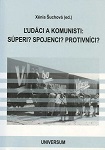Československo-sovietske spojenectvo z pohľadu mladoľudáckeho Nástupu
The Czechoslovak-Soviet Alliance from the Standpoint of the Nástup Fortnightly
Author(s): Milan Zemko
Subject(s): Diplomatic history, Political history, Recent History (1900 till today), History of Communism
Published by: Historický ústav SAV
Keywords: Czechoslovak-Soviet Alliance; The Ascent of the Young Slovak Autonomist Generation; Slovak People's Party;
Summary/Abstract: The fortnightly paper called Nástup mladej slovenskej autonomistickej generácie (“The Ascent of the Young Slovak Autonomist Generation”, abbreviated to Nástup – Ascent, issued in 1933- 1940), lead by the Ján and Ferdinand Ďurčanský brothers, stood like Hlinka's Slovak People's Party, on the right wing of the political spectrum in the First Czechoslovak Republic and unambiguously rejected the ideas and practice of the Soviet Communism, the Third International and the domestic Communist Party. This was also why Nástup was principally against any kind of alliance between Czechoslovakia and the Soviet Union as it considered both that country and the world Communist movement controlled by Moscow Bolsheviks as subversive not only of the Christian (Catholic) faith and morality but also of the social system respecting Christian values. Moreover, they refused the so-called Jewish-Bolshevik roots of Communism and the Soviet Union. At the same time, Nástup doubted the credibility and potential of the Soviet Union as an ally of Czechoslovakia because of political trials going on in Moscow, officially justified by the alleged treason of the tried Soviet politicians and soldiers.
Book: L'udáci a komunisti: Súperi? Spojenci? Protivníci?
- Page Range: 108-117
- Page Count: 10
- Publication Year: 2006
- Language: Slovak
- Content File-PDF

